David Slade | “90” mins | streaming (HD) | 2.20:1 | UK & USA / English | 15
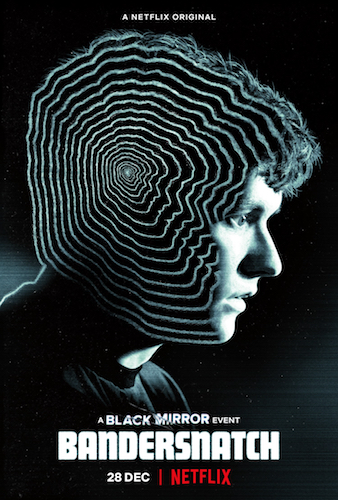
The latest addition to Charlie Brooker’s Black Mirror universe is the kind of work that pushes at the boundaries of form and medium — and therefore is the kind of work that challenges how I count things here at 100 Films. Is it a film? An episode of TV? A video game? Or is it genuinely something new? Well, it’s not really a video game — it’s not interactive enough to qualify as that. So is it a TV episode, then? It carries the Black Mirror branding, and that is a TV series. Plus it’s not a theatrical release… but then, neither are most Netflix films. Indeed, Bandersnatch carries its own listing on Netflix (as a standalone title, not an instalment of the series), and is promoted by Netflix as an “interactive film”. So, taking them at their word, I’ve decided that means it counts as a film.
It’s also, I think, very accurate branding — they debated internally how it should be promoted, and I think they’ve landed on the right term for it. As I said before, it’s not really a video game — it’s not as interactive as a gamer would expect it to be. The debate between film vs. TV episode is tighter, but when isn’t it these days? Either way, it’s not just your regular passive Netflix-viewing experience, because it is interactive. In practice, it plays like a video version of Choose Your Own Adventure books — you know what those are, right? I’ve heard some Young People don’t, which saddens me in my apparently-old-now early 30s. If you don’t know, in a CYOA book you’d read a passage of story, then be asked to make a choice on behalf of the hero; for Option A, you’d turn to page X, and for Option B you’d turn to page Y, and so on from there, with your choices dictating your path through the story.
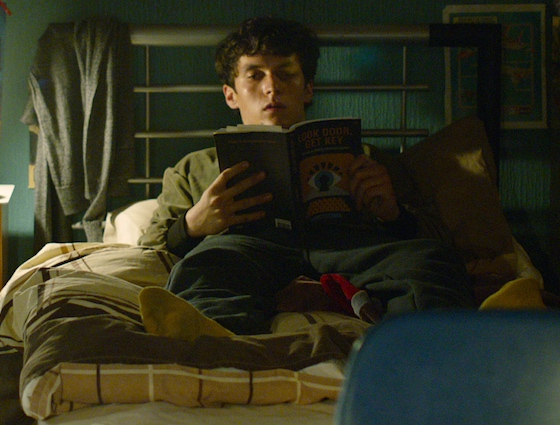
Bandersnatch is similar, only without all the manual flicking back and forth: every so often (roughly every three to five minutes, determined as the optimal period of time by Netflix’s product testers) you’re presented with two choices on screen and have ten seconds to pick one. Which you choose decides what you see happen next. (If you don’t choose, Netflix decides for you. Make no choices whatsoever and you’re led on a predetermined route that gets you through a full story in the shortest time possible.) Sometimes these choices are small (which breakfast cereal to eat?), sometimes significant (accept a job offer?). Netflix remembers them all, even the minor ones, which have knock on effects later. They made a rod for their own back in this respect, because having to account for viewers’ early choices led to requiring alternate scenes later on that only vary in how they include the viewers’ fundamentally-meaningless earlier choice. But that’s Netflix’s behind-the-scenes problem, not ours as viewers. Suffice to say, they’ve put the work in, and those little touches help make for an even more immersive experience: the choices themselves may have no bearing on the plot, but the fact the film remembers them and then uses them again later is a kind of meaning in itself.
By this point you’re probably wondering what it’s actually all about, especially if you’re not merely wowed by the technology. (If you are wowed by the technology, check out this article at Wired which goes into more detail about what was required.) Set in 1984, we’re introduced to 19-year-old Stefan (Fionn Whitehead), who lives with his dad (Craig Parkinson) and wants to be a video game designer. He’s managed to wangle a meeting with the company who publish games by his idol, Colin Ritman (Will Poulter). Stefan’s pitch is Bandersnatch, an adaptation of a classic Choose Your Own Adventure novel by Jerome F. Davies, who went mad. Stefan found the book among the possessions of his dead mother, an event which has left him seeing a therapist (Alice Lowe). As Stefan begins to write the program for Bandersnatch… well, what happens next is up to you.
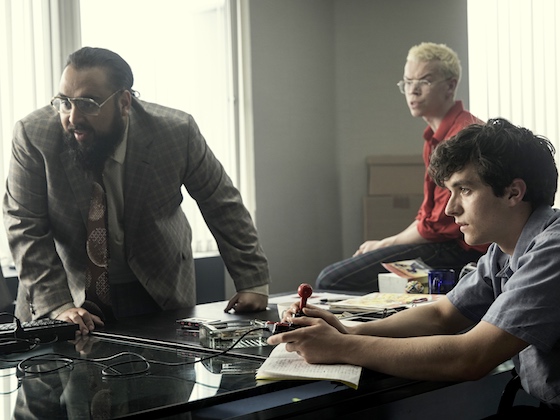
You can already see how content is reflecting form (you’re playing a Choose Your Own Adventure game about a guy writing a Choose Your Own Adventure game, just in case you needed that spelling out for you), and, well, I don’t want to spoil anything (as much as you can spoil anything about a film where every viewer will have a different experience), but it goes further down the rabbit hole than that. Trust Brooker and the Black Mirror team to have taken a new, emerging technology and made a drama about it — I mean, that’s pretty much the series’ MO. You can rely on them to not make things as straightforward as they first appear, either. Most of the time the film offers two options, each leading you down a different path, but sometimes it mixes it up (to say how would be to spoil the experience, like attempting to relate a joke from a comedy). And if you’re curious about how alternate pathways play out, don’t worry, you won’t have to watch the film from the start every time: after certain “game over” points, Bandersnatch offers the chance to jump back to earlier decisions and choose differently. If you’re interested enough to continue, this is definitely worth doing: as I said earlier, Netflix remembers all your choices — there are sometimes advantages to choosing that ‘continue’ option instead of starting from scratch at a later date.
Perhaps the most impressive thing about Bandersnatch, considering all the myriad choices and paths and possibilities it presents to the viewer, is that it all makes sense. That might sound like Filmmaking 101, but it’s a massive pitfall that would’ve been so, so easy for them to fall into. And they made it a more complicated job for themselves too, insisting the choices viewers make were genuinely meaningful and affected what happened and where the story went. It’s very cleverly written and constructed — it’s not designed to force you down a certain path, or give you a fake choice that doesn’t really change anything, but instead to do those things while still building to a cohesive whole. Yes, of course it’s not total free will to do whatever you fancy, and sometimes there’s no escaping a certain choice or development… but, with the way Brooker has married story and presentation medium, that’s all kinda part of the point.
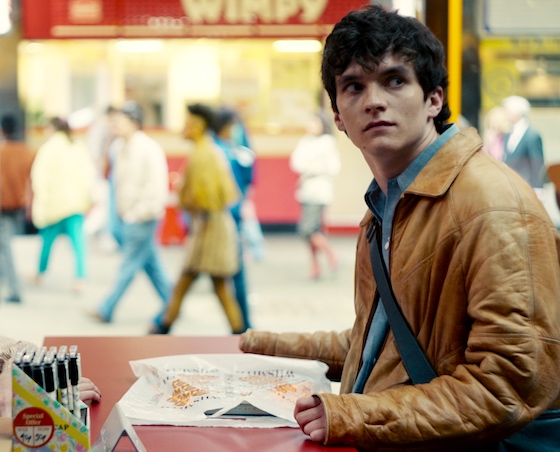
If you think about how Bandersnatch was made — the challenge it presented to Brooker as writer, to director David Slade, and to the cast having to negotiate their characters’ various emotional arcs across different permutations of similar scenes — it becomes even more impressive on a technical level. And that’s partly because you don’t have to consider the behind-the-scenes logistics to find this an enjoyable experience. They’ve executed it so consummately that you can just watch it, play it, experience it without needing to perform mental gymnastics to make it fit together, because they’ve accounted for all that and filmed the necessary alternate stuff and been certain it all pieces together. So you can instead apply brain power to what the film has to say about choice and free will, and to working out which alternative options you could choose and which parts of the story you perhaps haven’t experienced yet.
Plus, to an extent, how much you get out of Bandersnatch is rewarded by how much you’re prepared to put in. As I mentioned earlier, at the simplest level you can just put your remote down and watch it play out a 40-minute-ish Black Mirror episode via its default choices (selected by Brooker), giving you the most basic version of the story (I haven’t done this, but I’m tempted to give it a go). Or you can play through until you reach one of the five endings that bring you to the choice of a credits scroll. (Netflix’s official line is that there are five endings. Depending how you count it, there are definitely more.) Or you can keep going and going, taking those “continue” options and seeing where different choices lead you. Sometimes, they lead you to entirely new places. And while there are multiple endings, there’s an “official” ending, too; one where the credits roll and you end up back at the Netflix menu screen (or, I guess, go to something else playing, if you’re one of those weirdos who hasn’t turned that feature off), rather than another continue option.
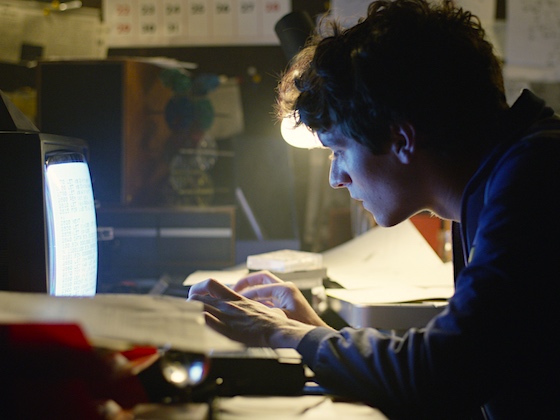
I played on until I came across that particular finale — partly because I’m a completist, partly because I was so engrossed in what I was watching. Did I experience every permutation the film has to offer? No, I’m pretty sure I didn’t; but I’m also pretty sure I experienced the bulk of the major ones. Did I get “lucky” that it took me so long to find that final-ending, meaning I saw a lot of the film before I got there? Put another way: is there a quicker path to that final-ending which would mean you saw less of the whole film than I did? Maybe there is. Or maybe there isn’t — maybe the only way to that ending is trial and error through multiple permutations. Or maybe there are multiple “final” endings, and when you’ve exhausted what the film feels it has to offer it throws you the appropriate one. Such are the secrets of Bandersnatch, which Reddit users will surely reveal in time. They’ve already made a start, although a thorough-looking flowchart doing the rounds on Twitter has already been proven to be missing at least a few possibilities.
However much time you choose to spend on it (Netflix say a thorough session would take two-and-a-half hours, although the BBFC certification reveals that there’s over five hours of footage required to make the whole thing function), Bandersnatch is a genuine experience, once again putting Netflix at the cutting edge crossroads of modern visual entertainment. Is it a film? A TV episode? A video game? All of those things? None of them — something else? Something new? Those who must experience such new things will need to try this out, of course — they probably already have. But it’s one for regular viewers, too, with a rewarding story to tell; one which could only have been adequately told with this newly-imagined technology. In my opinion, it’s a magnificent success, and a must-have experience.

Black Mirror: Bandersnatch is available to watch/play/whatever on Netflix now.
It placed 10th on my list of The 26 Best Films I Saw For the First Time in 2018.
